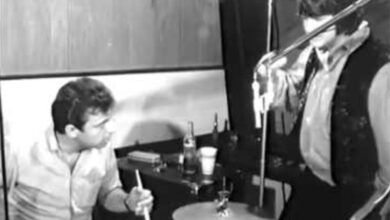Back in 1958, Conway Twitty released a melodious track titled “It’s Only Make Believe.”
Conway Twitty’s “It’s Only Make Believe” is a timeless ballad that epitomizes the essence of classic country music. Released in 1958, the song skyrocketed Twitty to fame, becoming his first major hit and establishing him as a prominent figure in the music industry. Its romantic lyrics and haunting melody struck a chord with audiences, earning it a permanent place in the annals of music history.
The song tells the story of unrequited love, with Twitty’s emotive vocals conveying the pain and longing of a narrator who realizes that the love they once shared was only a figment of their imagination. The heart-wrenching sincerity of Twitty’s delivery, coupled with the lush orchestration and sweeping melody, evokes a sense of melancholy and yearning that resonates with listeners.
“It’s Only Make Believe” became an instant classic, topping the charts in both the United States and the United Kingdom and earning Twitty widespread acclaim. Its success paved the way for Twitty’s subsequent hits and solidified his reputation as one of the leading artists of his generation.
Conway Twitty, born Harold Lloyd Jenkins on September 1, 1933, in Friars Point, Mississippi, rose to prominence as one of the most successful and enduring figures in country music history. With a career spanning over five decades, Twitty achieved remarkable success as a singer, songwriter, and performer, leaving an indelible mark on the genre.
Twitty’s musical journey began in the 1950s, when he first gained attention as a rock and roll artist under his birth name, Harold Jenkins. However, it was his transition to country music in the early 1960s, and his subsequent collaboration with legendary songwriter and producer Owen Bradley, that catapulted him to superstardom.
Throughout his career, Twitty recorded a string of chart-topping hits, including “Hello Darlin’,” “Tight Fittin’ Jeans,” and “I’d Love to Lay You Down.” His smooth baritone voice and charismatic stage presence made him a favorite among audiences, while his ability to infuse emotion into his performances set him apart as a true artist.
In addition to his solo success, Twitty also found acclaim as a duet partner, collaborating with artists like Loretta Lynn, with whom he recorded a series of chart-topping duets, including “After the Fire Is Gone” and “Lead Me On.”
Twitty’s impact on the music industry extended beyond his own recordings, as he also wrote songs that were recorded by other artists and produced albums for up-and-coming performers. His business acumen and entrepreneurial spirit helped him build a successful career that transcended music, including ventures in real estate and entertainment.
Despite his untimely passing on June 5, 1993, Twitty’s legacy continues to endure, with his music remaining a staple of country radio and his influence felt in the work of countless artists who followed in his footsteps. From his early days as a rockabilly sensation to his reign as the “High Priest of Country Music,” Conway Twitty’s contributions to the genre are undeniable, ensuring his rightful place among the legends of country music.





